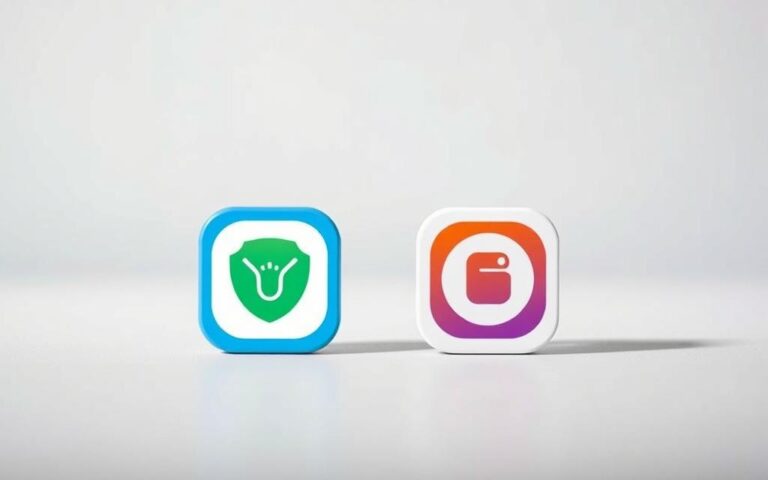Did you know over 90% of students use mobile apps for learning? Technology has changed how we learn, making educational apps for math and language learning key. Photomath is a great example, offering step-by-step help for tough math problems.
Mobile devices are now key in education. For those wanting to learn English, there are many apps available. These apps let users learn at their own speed, offering a personal touch that old methods can’t.
Understanding the Importance of Learning Apps
Learning apps have changed how we learn. With new tech, mobile learning is now popular. It lets people learn at their own speed, making education more personal.
The Rise of Mobile Learning
Mobile learning has changed education. It makes learning available everywhere, anytime. This lets people learn in their daily lives, not just in classrooms.
ESL mobile apps help people improve their English. They offer lessons, interactive content, and resources that fit your schedule.
Benefits of Learning on-the-go
Learning on-the-go makes education fun and effective. With mobile apps, you can get help from an online English tutor. Virtual classes offer real-time practice, helping you learn English better.
Key benefits include:
- Convenience: Learn anytime, anywhere, fitting education into busy lifestyles.
- Flexibility: Self-paced lessons accommodate different learning speeds and styles.
- Accessibility: Opportunities to connect with a community of learners and tutors globally.

Top English-Learning Apps to Consider
Language learning apps are getting more popular. Many apps offer special features for different learning styles. They make learning fun and effective. Here are three top apps for improving your English skills.
Duolingo: A Fun and Engaging Experience
Duolingo makes learning a game. It has quizzes and challenges to keep you motivated. It’s great for beginners, making digital English lessons easy to start.
Babbel: Practical Language Skills
Babbel focuses on skills you can use every day. Its lessons are designed for real-life conversations. It’s perfect for those who want to use English in daily life.
Rosetta Stone: Immersive Learning Method
Rosetta Stone uses a deep learning method. It combines visuals and sounds to help you learn naturally. This way, you can think in English and understand it better.
| App | Key Feature | Learning Style |
|---|---|---|
| Duolingo | Gamification | Interactive and engaging |
| Babbel | Real-life application | Practical and conversational |
| Rosetta Stone | Immersive techniques | Visual and auditory integration |
Features to Look For in an English-Learning App
Choosing the right English-learning app is crucial for improving your language skills. Look for features that make the app easy to use and fun. These elements greatly affect how well you learn.
User-Friendly Interface
A good app should be easy to use. A simple design lets you move through lessons without trouble. This makes learning more fun and less frustrating.
Apps that are easy to get around help you focus better. They create a positive space for learning.
Interactive Lessons and Exercises
Interactive lessons keep you engaged. Apps with quizzes, games, and videos make learning fun. This helps you remember what you learn better.
Interactive lessons also help you practice speaking, listening, reading, and writing. These skills are essential for mastering a language.
Progress Tracking and Reporting
Tracking your progress is important. Many apps let you see how you’re doing. This helps you know what you’re good at and what you need to work on.
Getting feedback and reports can motivate you. Seeing how far you’ve come can make learning more rewarding.
| Feature | Description | Importance |
|---|---|---|
| User-Friendly Interface | Simplifies navigation for users | Enhances overall learning experience |
| Interactive Lessons | Involves users in the learning process | Promotes retention and understanding |
| Progress Tracking | Monitors advancement in language skills | Encourages motivation and goal-setting |
Comparing Free and Paid English-Learning Apps
There are many English-learning apps out there, both free and paid. Knowing the differences helps learners choose what’s best for them. Each option has its own pros and cons, so it’s important to think about them carefully.
Free App Offerings vs. Subscription Models
Free apps usually have fewer features and less content. They might offer basic vocabulary and grammar quizzes. These are good for casual learners.
Paid apps, or subscription models, offer more. They have advanced resources like detailed lesson plans and interactive exercises. The choice often depends on how serious you are about learning.
Value of Premium Features
Premium features in paid apps make a big difference. They include personalized learning paths and in-depth tracking. This makes learning more effective and tailored to you.
While free apps teach the basics, paid apps offer a deeper and more structured learning experience. This is especially true for serious learners.
Tips for Maximizing Your Learning Experience
To get the most out of a language learning app, it’s important to use smart strategies. Setting realistic goals and staying consistent are key. This way, you can improve your skills and enjoy the learning process.
Setting Realistic Goals
Setting achievable goals helps you stay motivated. Instead of aiming too high, start with small steps like learning a few words each day. This keeps you excited about learning.
Working with an online English tutor can also help. They can track your progress and point out areas where you need to improve.
Consistent Practice and Engagement
Using a language learning app regularly is essential for retaining information. Try different lessons and exercises to keep things interesting. This helps you grow and feel more confident in your language skills.
Having an online English tutor can make a big difference. They offer personalized advice and support, helping you learn in a way that suits you best.
The Future of English Learning Apps
The digital world is changing fast, and English learning apps are getting a big upgrade. New tech is making these apps more fun and easy to use. This means learning English will be more exciting and tailored to each person’s way of learning.
Incorporating AI and Personalization
AI is playing a big role in language learning apps now. It helps by adjusting lessons based on how well you’re doing. This makes learning more effective and boosts your confidence as you see progress in your own way.
Trends to Watch in Language Acquisition
There are new trends that could change how we learn languages. Augmented and virtual reality (AR/VR) are making learning feel like real-life experiences. Also, better analytics will help track your progress and challenges, making learning even more effective.



